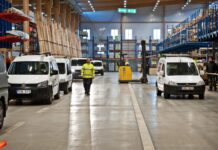Thierry Coeman shares with us more than three decades of experience in the international Home Improvement Sector.
He was the chairman of the Belgian DIY Association, a unique organisation which brought together retailers, independents and manufacturers much like Hardware Association Ireland. In Europe, pure DIY trade fairs have become a rarity, with only a handful remaining. Construction & Building trade fairs, such as those in Munich and Paris, continue to be held in several European countries, targeting specific professional market segments. Meanwhile, cities like Cologne, Dublin, Bergamo, Kortrijk, and Valencia have chosen to keep investing in the concept of Home Improvement Trade Fairs. However, this formula has almost disappeared from the agenda in countries including France, the United Kingdom, and the Netherlands.
Trade fairs are often seen as meeting platforms that facilitate interaction between manufacturers/suppliers and professional visitors. In reality, their significance goes far beyond this. post-pandemic, the relevance of specifically DIY & Home Improvement trade fairs has increased significantly due to five key factors:
- Pressure on traditional retail: The rise of e-Commerce has significantly impacted the traditional distribution role of brick-and-mortar stores.
- Reinventing the business model: All stakeholders (organisers, exhibitors, and visitors) recognised the need to fundamentally rethink their value proposition.
- Societal changes: Over the past decade, societal structures have changed drastically, affecting how people build, design, and organise their homes.
- Shifting lifestyles: The motivations and expectations of current and future generations are evolving rapidly and lack stability.
- Impact of the digital revolution: DIY activities are increasingly seen as less of a leisure activity.
In this broader context, there is a pressing need for deep insights to make these developments more manageable for all parties involved. The challenge is to anticipate these changes in time and to provide accurate proposals and solutions.
It is noteworthy that many leading players in the Home Improvement sector have successfully made substantial progress. Trade fair programs and conferences now focus not only on products and concepts but also on societal developments, lifestyles and the buying motivations of various types of DIYers.
Trade Fairs as Knowledge Hubs
International trade fairs have evolved into knowledge centres where industry leaders translate insights into product and retail concepts. Exhibitors have adapted, transitioning from their traditional sales role as basically product manufacturers to that of conceptual marketers and educators.
The challenge? Transforming a trade fair stand into a B2B environment that actively drives sales and provides great ideas and inspiration. The success of a trade fair stand depends on mastering six key parameters that sensorially convince professional visitors:
- The intrinsic added value of a product.
- Demonstration of user-friendliness.
- Showcasing functionality.
- The experience and fun factor on the retail shelf.
- Transferring knowledge through educational methods.
- Testimonials and reviews as proof of reliability.
Looking Ahead:
The International Hardware Fair in Bergamo
The upcoming trade fair in Bergamo is already attracting significant attention, with numerous retail delegations from across Europe registering as visitors.
Alice Brambilla, Project Manager at the International Hardware Fair Italy, succinctly summarises the latest trend: “Retailers no longer send only their purchasing teams to trade fairs. Increasingly, they are mobilising experts from other departments, including marketing, logistics, CRM, and data intelligence. Trade fairs are no longer just meeting platforms; they have become strategic hubs where knowledge, innovation and intelligent networking converge”.
The latest ‘Matchmaking’ formula aligns perfectly with the interests of the targeted audience. Bart Bouwen, purchasing director at Hubo Group and Bricoalliance, highlights that his teams can schedule dozens of meetings in advance with carefully selected manufacturers and distributors. This approach ensures the trade show visit is highly efficient and profitable for all parties involved.
“This evolution underscores their enduring relevance in a rapidly changing world”.
In a nutshell, precisely because the entire professionalisation is concentrated in one location with various exhibition spaces, trade fairs remain indispensable. However, this is only the case if they succeed in creating an optimal symbiosis between supply and demand, thereby making the value proposition much clearer to all stakeholders, including the end user.











